Charity Runs are a popular way for organizations to raise aw
Charity Runs are a popular way for organizations to raise awareness and get fit at the same time. However, these events can be tough to organize. The Princess Half Marathon Weekend, for example, has as many as 40,000 runners raising money and awareness for the Children’s Miracle Network Hospitals. People can run both 5ks and 10ks and there’s even a children’s race.
Your program will help manage the following:
1) Individual Registration
2) Team Registration
3) Running Events
4) Donation Totals
Your program will log the number of teams and individual who are signed up for the different races, process the racing events to see who has the fastest times, and track the total amount of money raised by teams and individuals for charity.
Header Specification
To facilitate grading, include in your header comment which portions of the assignment you have completed. You must complete all portions in order to earn full credit, but partial credit is available for completing some of the steps. The primary steps are as follows:
(1) Processing Individual Registrations
(2) Processing Team Registrations
(3) Processing the running events
(4) Calculating total donations
If your comment is accurate, meaning that you pass the appropriate tests cases corresponding to your choice, you\'ll earn 10 points. If your comment is roughly accurate, meaning that you sincerely attempted the items you listed, and most of them work minus a tiny bug, then you\'ll get 5 of these points. If your comment isn\'t accurate to a reasonable degree, you\'ll get 0 of these points.
The reason this is here is because it\'s very important to communicate to others accurately what you\'ve accomplished and what is left to accomplish. This sort of honesty and ability to appraise your own work is a critical skill in a job.
Program Details
Individual Registration Details
There are a two registration windows: early registration and regular registration. Prices for registering early and regularly will be given. Each individual will have a unique number and must be processed separately to record their name, age, running event, and donations raised. The maximum number of runners for our program will be 10000.
Team Registration Details
Teams may be created and registered to sign up several participators at once. Teams may only sign up during early registration, have between 5 and 50 members, and must pay the team registration fee for every member on the team. Teams should be recorded with their name and number of members. Each member of the team still needs to be recorded with their name, age, running event, and donations raised. We can organize at most 200 teams.
Running Events Details
There will be three running events: a 5k race, a 10k race, and a marathon race. For each race, your program will receive the running time for each participant in the race. For the 5k and the 10k you should print the runner with the fastest time. For the marathon, your program will need to check times against the required qualifying times to see which runners qualify for more marathon races. These qualifying times vary by age group.
Total Donation Details
After all the races are run we want to recognize the participants who raised the most money for charity. Print the team that raised the most money for the event along with the amount raised. Then for each team, print the team member who raised the most money along with the amount raised. For the individuals, print the top individual who raised the most money along with the amount raised. Finally, print the total amount raised for the event. All donations and registration fees will be donated directly to charity.
Implementation Restrictions
You must use the following constants:
#define TEAMS 200
#define RUNNERS 10000
#define LENGTH 20
#define TEAMSIZE 50
You must use the following structures to store information:
struct person {
char name[LENGTH];
int number;
int age;
int event;
float money;
float time;
};
struct team {
char name[LENGTH];
int nummembers;
float money;
struct person members[TEAMSIZE];
};
It is not sufficient to simply have the structures in your program, you must use them store information and process operations for the program.
Though function prototypes will not be provided, it is expected that you follow good programming design and create several functions with well-specified tasks related to the solution of this problem. Make sure to pay very careful attention to parameter passing.
Input Specification
The first line of the file contains the following three values, separated by spaces:
Cost of early registration for individuals (in dollars), Cost of regular registration for individuals (in dollars), and the cost of team registration (in dollars). These will be positive real numbers to two decimal places.
The second line of the file will contain one positive integer representing the number of early individuals and teams who are registering. Every registration will start with either TEAM or INDV for a team registration or individual registration respectively.
Lines that begin with INDV will be followed by four values, separated by spaces:
The individual’s name, their age, their chosen running event, and the amount of donations they have raised. The first is a string, the second is a positive integer, the third is an integer from the set {5, 10, 42}, and the fourth is a positive real number.
Lines that begin with TEAM will be followed by two values, separated by spaces: the name of the team and the number of team members (k). This will be followed by k lines organized the same as the individual registration above.
After early registration completes, normal registration can begin. This will be represented by one positive integer (m) representing the number of regular registrations. All teams must use early registration. This will be followed by m lines each with four values. These are the same values that are present in individual registration: The team member’s name, their age, their chosen running event, and the amount of donations they have raised. The first is a string, the second is a positive integer, the third is an integer from the set {5, 10, 42}, and the fourth is a positive real number.
After registration, the running events can occur. Every registered participant will be listed with their number (assigned as part of registration) and the time it took them to run the race in minutes represented as a real number.
This will be followed by 10 lines of qualifying times based on age groups. They will be specified:
STARTINGAGE ENDINGAGE TIME
where starting age and ending age are integers, and the qualifying time is a real number representing minutes.
Output Specification
For an individual registering for an event print a line of the form:
X registered for the Y race! They have been assigned the number Z.
where X is their name and Y is the event they are registering for. Y is represented by an integer {5, 10, 42} in the input file. Replace it with “5k” for the first integer, “10k” for the second integer, and “marathon” for the third integer in this print statement. Z is their unique runner number. These numbers should start at 1 and count up to a max of 10000.
For a team registering print a line with one of the form:
X team registered for the event. They have Y members:
where X is the team name and Y is their number of members. Follow this with Y lines of the same form as the individuals: one for each member of the team.
For the 5k race and the 10k race, output a single line of the following form:
Xk race: Y had the fastest time with Z.Z minutes!
where X is either 5 or 10 respectively, Y represents the name of the fastest runner and Z represents their time.
For the marathon race, print out all the runners who times meet the qualifying times:
X qualified in the marathon run with a time of Y.Y minutes!
where X represents the name of the fastest runner and Y represents their time.
For the team that raised the most money, output a single line of the following form:
The X team raised the most money with a team donation of $Y.YY!
where X is the team name and Y is the amount they raised.
For each team, print out the person that raised the most with a single line of the following form:
X raised the most money on team Y with a donation of $Z.ZZ!
where X is the person’s name, Y is the team name, and Z is the amount they raised.
For the individual that raised the most money, output a single line of the following form:
X raised $Y.YY!
where X is the person’s name and Y is the amount they raised.
End with the total amount raised by the event:
The runners raised $X.XX for charity!
Sample Input/Output
Four sets of input and output are provided with the assignment, showing the different portions of the assignment. You should try to complete race01 first, then proceed to race02, and so forth.
Each test file is labeled as raceXX.txt for input and raceXX.out for output. Out files can be opened in notepad and other unformatted text editors.
Solution
// C# Solution to above problem - It reads from file passed as args[0] you can replace it with file name
using System;
using System.Collections.Generic;
using System.IO;
using System.Linq;
namespace CheggQuestion
{
class Program
{
public const int TEAMS = 200;
public const int RUNNERS = 10000;
public const int LENGTH = 20;
public const int TEAMSIZE = 50;
public const int QUALIFYING_LINES = 10;
public struct person
{
public char[] name;
public int number;
public int age;
public int @event;
public float money;
public float time;
};
public struct team
{
public char[] name;
public int nummembers;
public float money;
public person[] members;
};
public static Dictionary<int, string> Races = new Dictionary<int, string> { { 5, \"5k\" }, { 10, \"10k\" }, { 42, \"Marathon\" } };
public struct qualifyMarathon
{
public int startAge;
public int endAge;
public float qualifyTime;
}
static void Main(string[] args)
{
using (var fileStream = File.OpenText(args[0]))
{
var individuals = new List<person>();
var teams = new List<team>();
// Input Cost Values
var costValues = fileStream.ReadLine().Split(\' \');
float costEarlyIndividuals = float.Parse(costValues[0]);
float costRegularIndividuals = float.Parse(costValues[1]);
float costTeam = float.Parse(costValues[2]);
// Input Early Registrations
int numberOfEarlyRegistrations = int.Parse(fileStream.ReadLine());
for (int i = 0; i < numberOfEarlyRegistrations; i++)
{
var line = fileStream.ReadLine();
if (line.StartsWith(\"INDV\"))
{
// Input Individuals - startIndex remains 1 as starts with INDV
var individualDetails = line.Split(\' \');
person individual = GetPersonDetails(individualDetails);
individuals.Add(individual);
}
else // if (line.StartsWith(\"TEAM\"))
{
// Input Team Details
var teamDetails = line.Split(\' \');
var team = new team();
team.name = teamDetails[1].Substring(0, LENGTH).ToCharArray();
team.nummembers = int.Parse(teamDetails[2]);
team.members = new person[team.nummembers];
for (int j = 0; j < team.nummembers; j++)
{
// Input Individual Details -startIndex remains 1 as starts with INDV
var individualLine = fileStream.ReadLine();
var individualDetails = individualLine.Split(\' \');
var individual = GetPersonDetails(individualDetails);
team.members[j] = individual;
team.money += individual.money;
}
// Teams Exceeded
if (team.nummembers > TEAMSIZE)
{
Console.Error.WriteLine($\"Value of team {team.name} size {team.nummembers} exceeded permissible count {TEAMSIZE}\");
}
teams.Add(team);
}
}
// Teams Exceeded
if (teams.Count > TEAMS)
{
Console.Error.WriteLine($\"Value of teams count {teams.Count} exceeded permissible count {TEAMS}\");
}
int numberOfRegularRegistrations = int.Parse(fileStream.ReadLine());
for (int i = 0; i < numberOfRegularRegistrations; i++)
{
// Input Individuals and it contains 4 values directly
// startIndex sets to 0
var line = fileStream.ReadLine();
var individualDetails = line.Split(\' \');
var individual = GetPersonDetails(individualDetails, 0);
individuals.Add(individual);
}
// Input Time Values for all registrations
var totalRegistrations = numberOfEarlyRegistrations + numberOfRegularRegistrations;
for (int k = 0; k < totalRegistrations; k++)
{
var line = fileStream.ReadLine();
var timeValues = line.Split(\' \');
var number = int.Parse(timeValues[0]);
var time = float.Parse(timeValues[1]);
}
var qualifyMarathons = new qualifyMarathon[QUALIFYING_LINES];
// Input Qualifying Marathon Details
for (int l = 0; l < QUALIFYING_LINES; l++)
{
var line = fileStream.ReadLine();
var qualifyTimeValuesForMarathon = line.Split(\' \');
var startingAge = int.Parse(qualifyTimeValuesForMarathon[0]);
var endingAge = int.Parse(qualifyTimeValuesForMarathon[1]);
var qualifyingTime = float.Parse(qualifyTimeValuesForMarathon[2]);
qualifyMarathon qualifyRound;
qualifyRound.startAge = startingAge;
qualifyRound.endAge = endingAge;
qualifyRound.qualifyTime = qualifyingTime;
qualifyMarathons[l] = qualifyRound;
}
// Output Individuals
individuals.ForEach(PrintIndividual);
// Output Teams
teams.ForEach(PrintTeam);
// Output Fastest 5k and 10k Individuals
var allIndividuals = new List<person>();
allIndividuals.AddRange(individuals);
teams.ForEach(team => allIndividuals.AddRange(team.members));
var fastest5K = allIndividuals.Where(person => person.@event == 5).OrderBy(person => person.time).First();
PrintFastest(fastest5K);
var fastest10K = allIndividuals.Where(person => person.@event == 10).OrderBy(person => person.time).First();
PrintFastest(fastest10K);
// Teams Exceeded
if (allIndividuals.Count > RUNNERS)
{
Console.Error.WriteLine($\"Value of runners count {allIndividuals.Count} exceeded permissible count {RUNNERS}\");
}
// Output Qualify Rounds
foreach (var qualifyRound in qualifyMarathons)
{
foreach (var individual in allIndividuals.Where(person => person.@event == 42 && person.time < qualifyRound.qualifyTime && (person.age >= qualifyRound.startAge && person.age <= qualifyRound.endAge)))
{
Console.WriteLine($\"{individual.name} qualified in the marathon run with a time of {individual.time.ToString(\"#.##\")} minutes!\");
}
}
// Team with most money
var mostMoneyTeam = teams.OrderByDescending(team => team.money).First();
Console.WriteLine($\"The {mostMoneyTeam.name} team raised the most money with a team donation of ${mostMoneyTeam.money.ToString(\"#.##\")}!\");
// Individual of the Team with most money
foreach (var team in teams)
{
var individualMostMoney = team.members.OrderByDescending(individual => individual.money).First();
Console.WriteLine($\"{individualMostMoney.name} raised the most money on team {team.name} with a donation of ${individualMostMoney.money.ToString(\"#.##\")}!\");
}
// Individual with most money
var mostMoneyIndividual = allIndividuals.OrderByDescending(person => person.money).First();
Console.WriteLine($\"{mostMoneyIndividual.name} raised ${mostMoneyIndividual.money.ToString(\"#.##\")}!\");
// Total money raised by charity - Registration Sum + Donation Sum
var registrationSum = costTeam * teams.Count + costEarlyIndividuals * (numberOfEarlyRegistrations - teams.Count) + costRegularIndividuals * numberOfRegularRegistrations;
Console.WriteLine($\"The runners raised ${ (registrationSum + allIndividuals.Sum(person => person.money)).ToString(\"#.##\")} for charity!\");
}
}
private static void PrintFastest(person fastest)
{
Console.WriteLine($\"{Races[fastest.@event]} race: {fastest.name} had the fastest time with { fastest.time.ToString(\"#.##\")} minutes!\");
}
private static void PrintTeam(team team)
{
Console.WriteLine($\"{team.name} team registered for the event. They have {team.nummembers} members:\");
team.members.ToList().ForEach(PrintIndividual);
}
private static void PrintIndividual(person individual)
{
Console.WriteLine(string.Format($\"{individual.name} registered for the {Races[individual.@event]} race! They have been assigned the number {individual.number}.\"));
}
private static person GetPersonDetails(string[] individualDetails, int startIndex = 1)
{
var individual = new person();
individual.name = individualDetails[1].Substring(0, LENGTH).ToCharArray();
individual.age = int.Parse(individualDetails[2]);
individual.@event = int.Parse(individualDetails[3]);
individual.money = float.Parse(individualDetails[4]);
return individual;
}
}
}
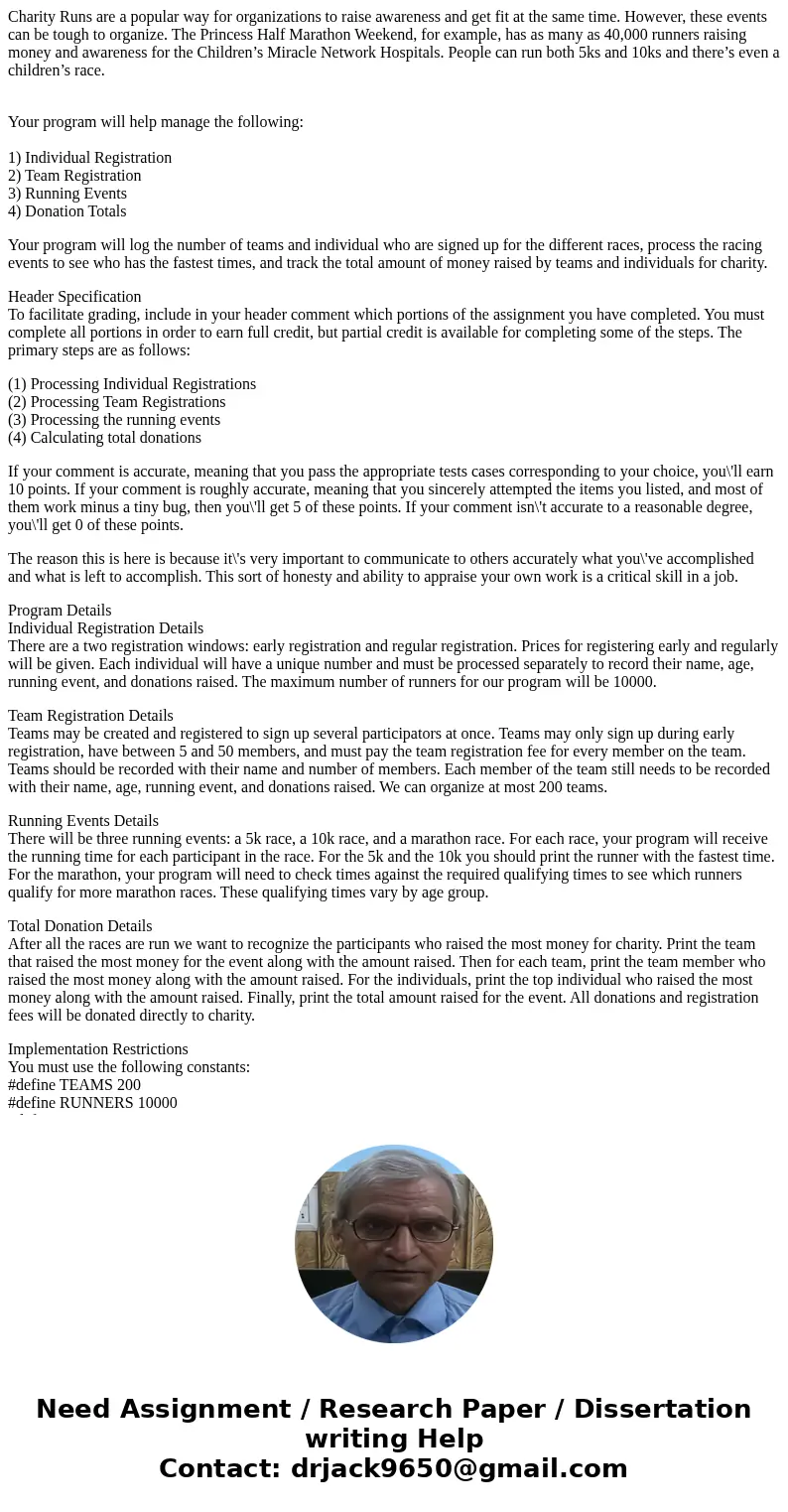
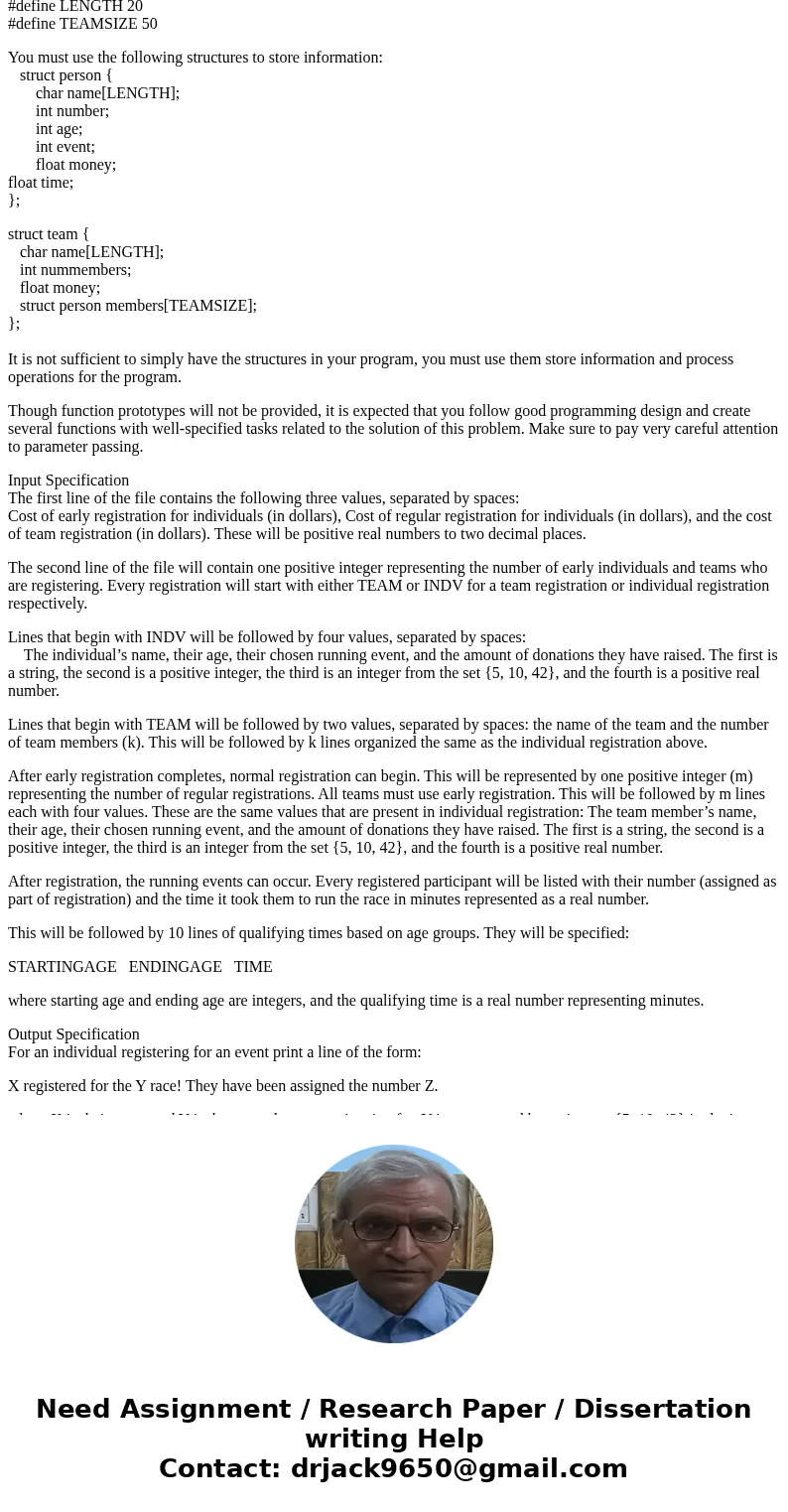
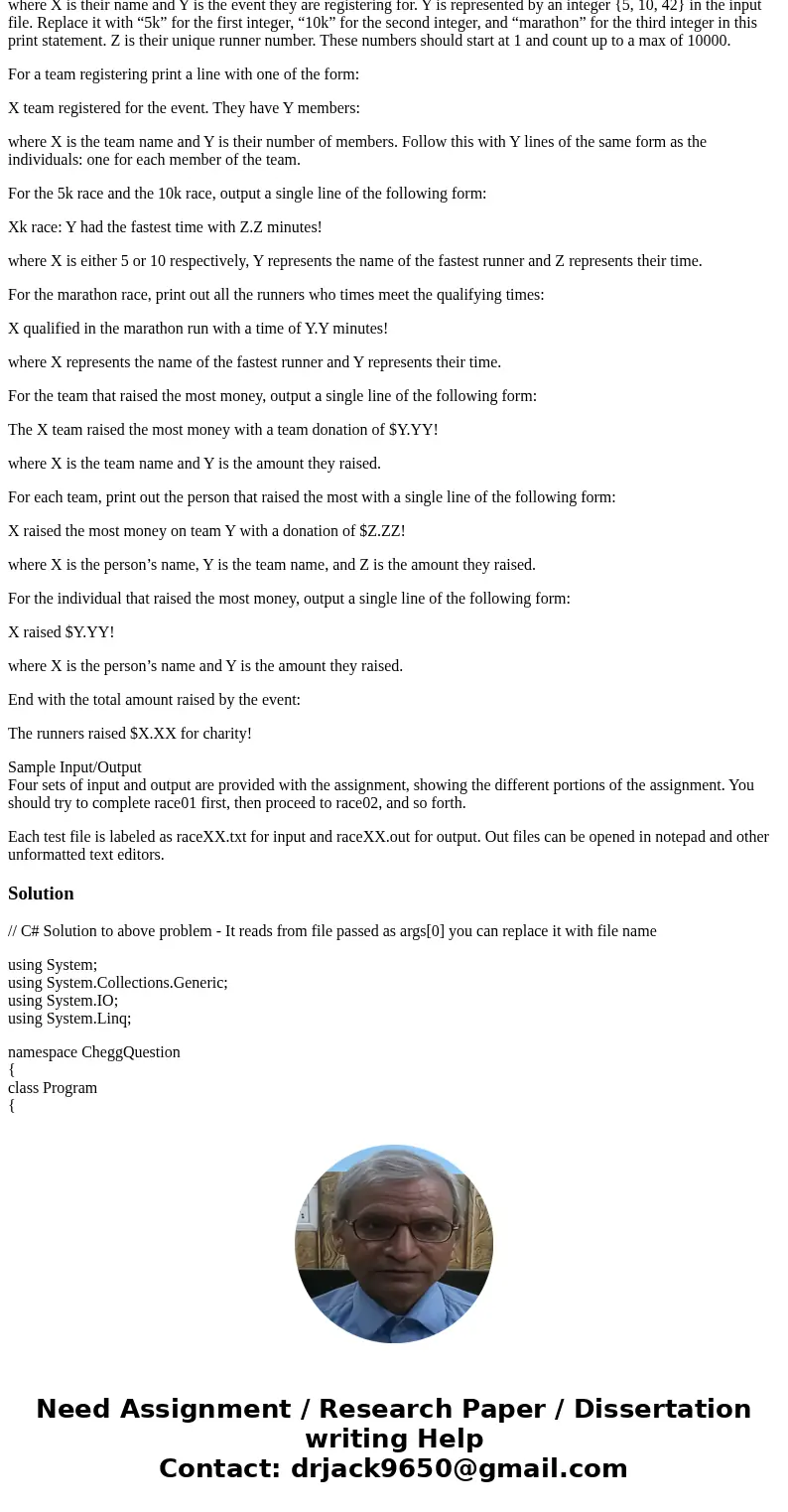
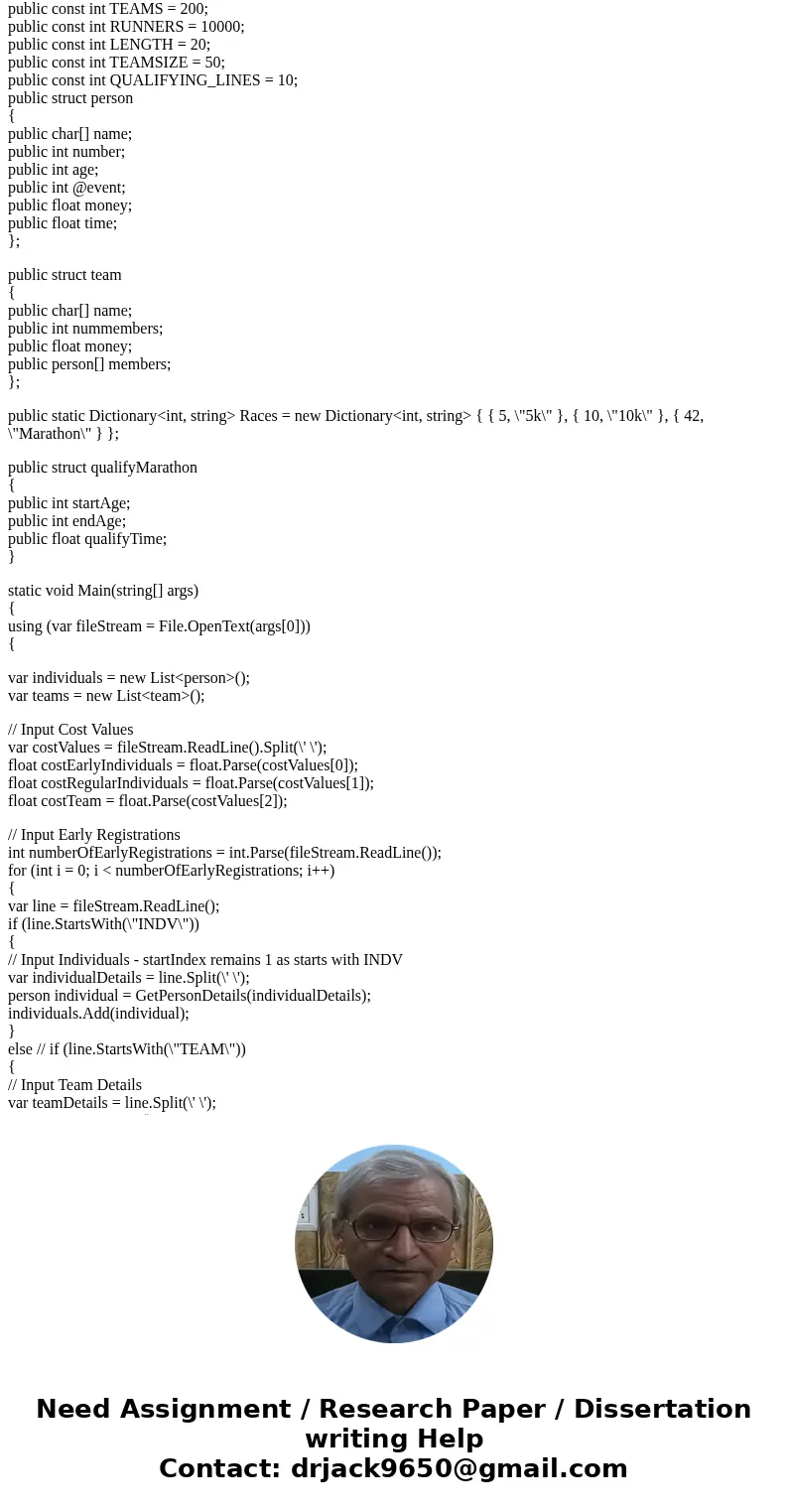
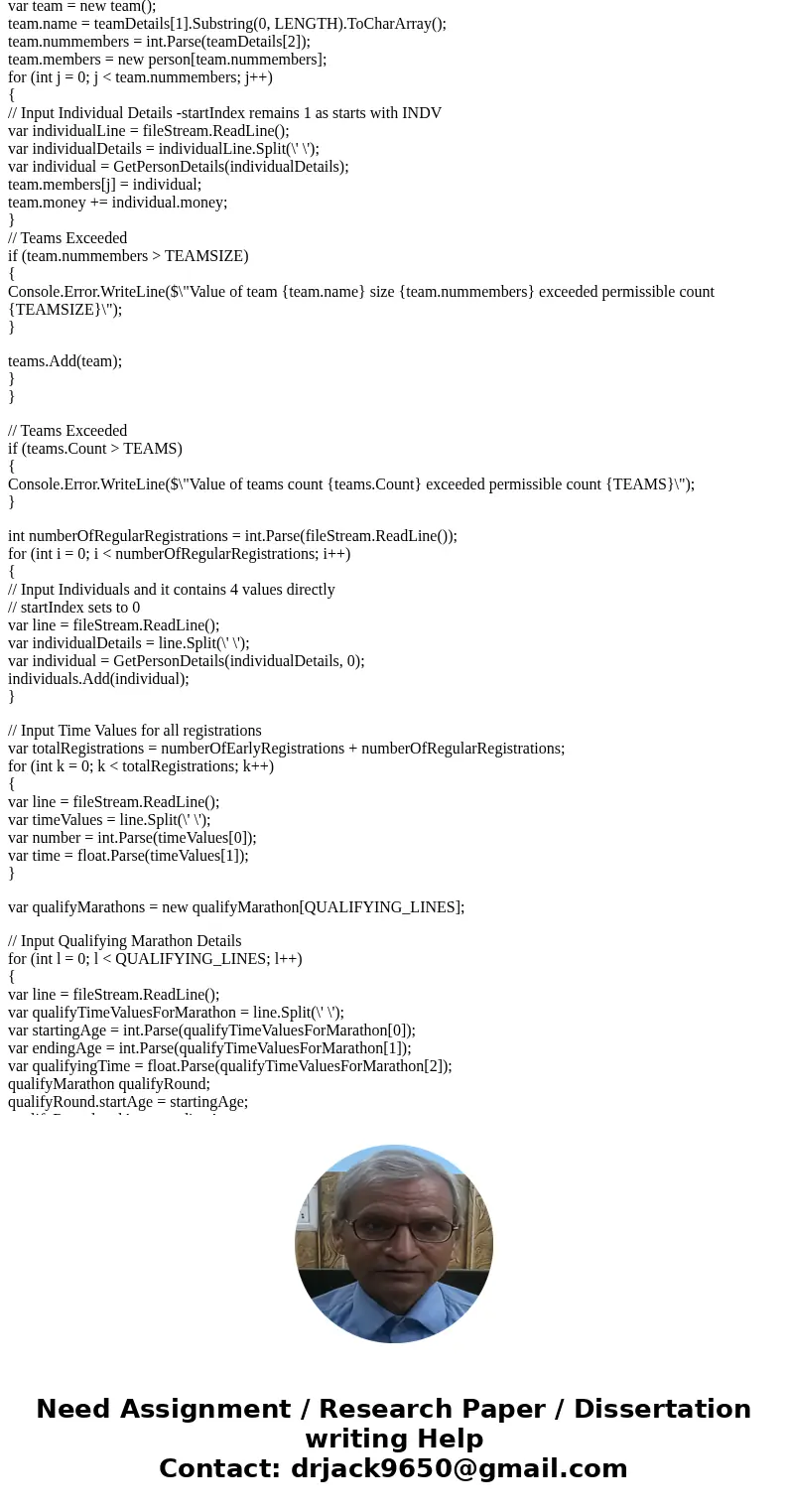
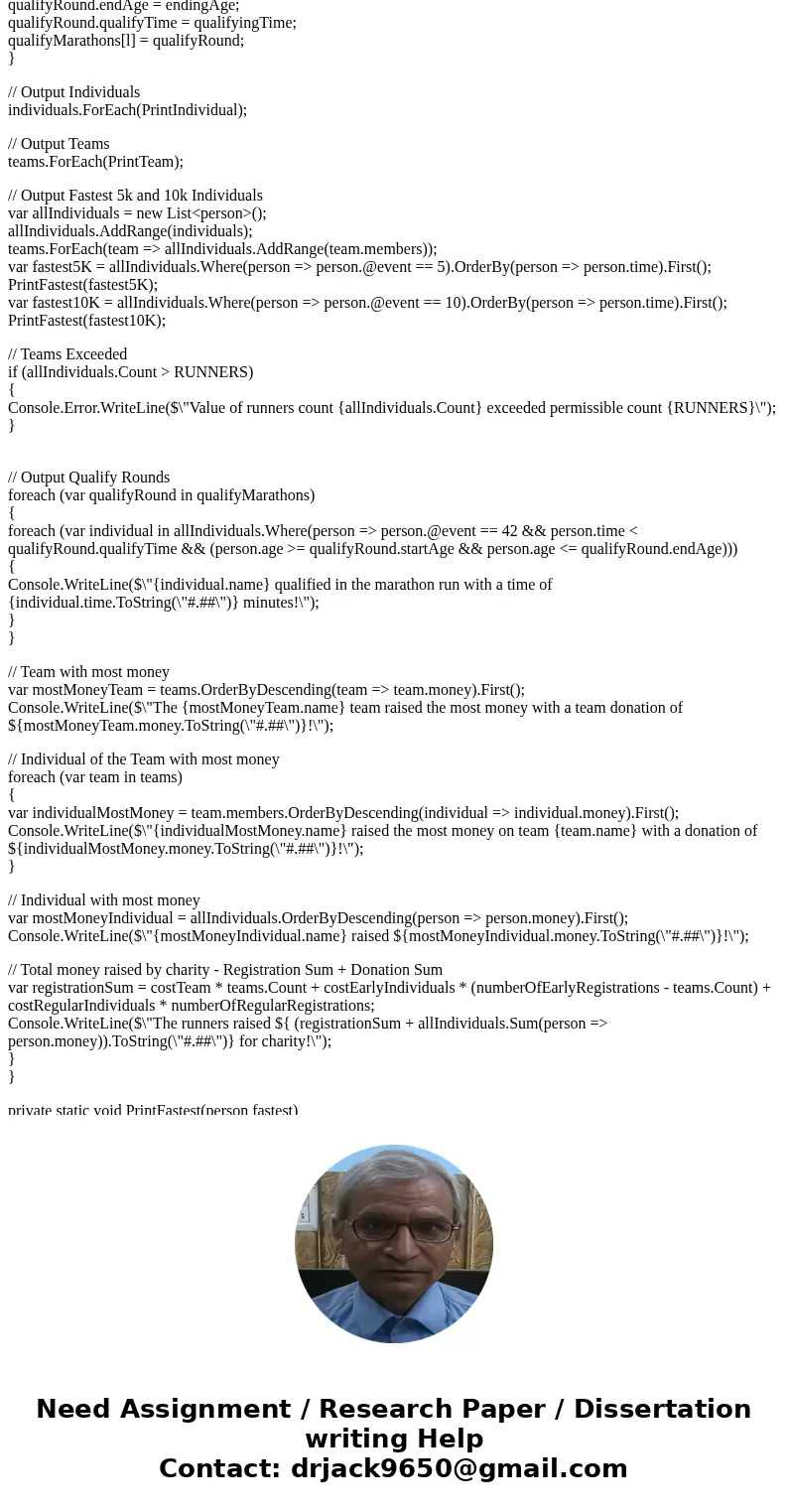
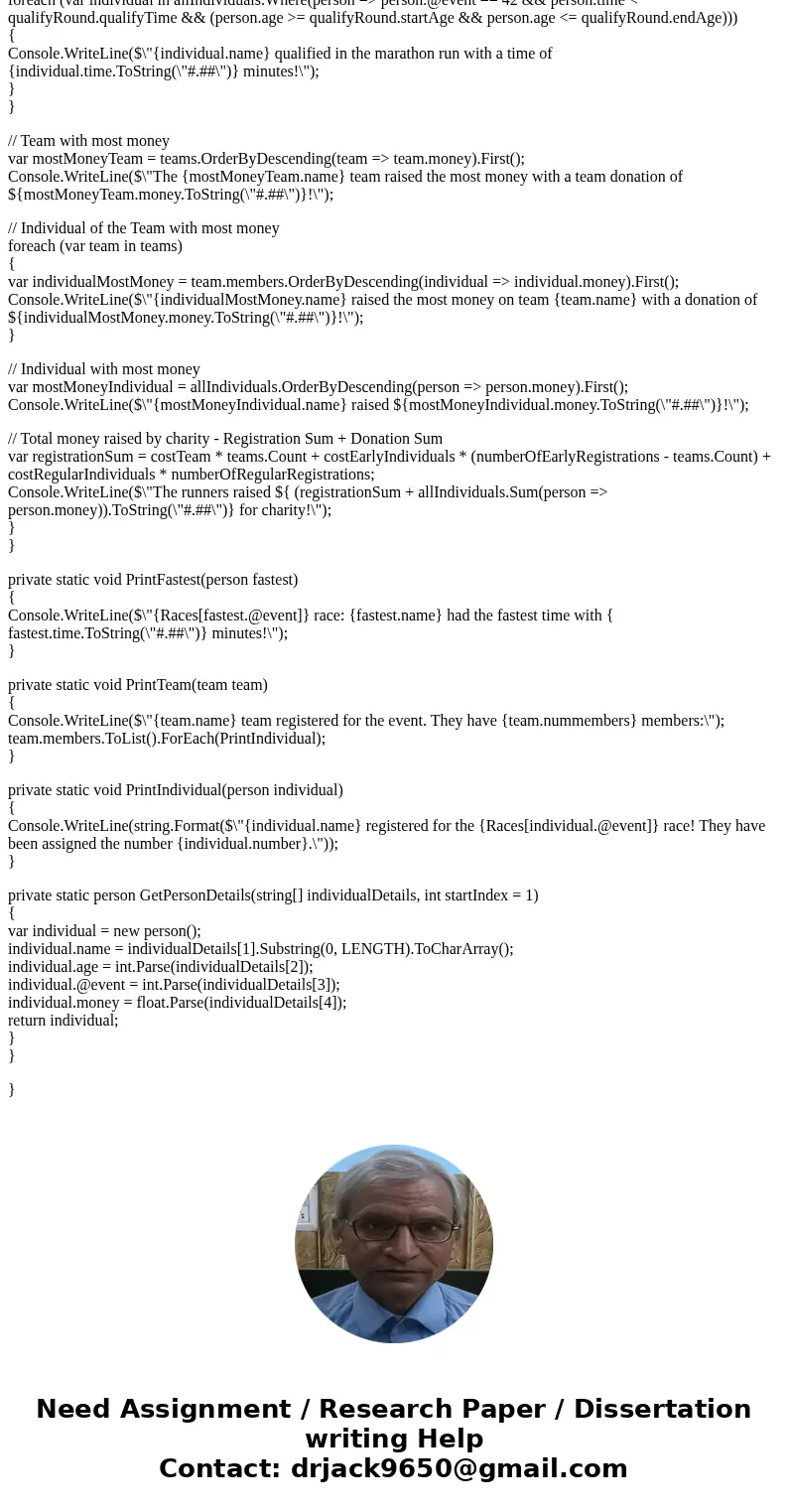
 Homework Sourse
Homework Sourse